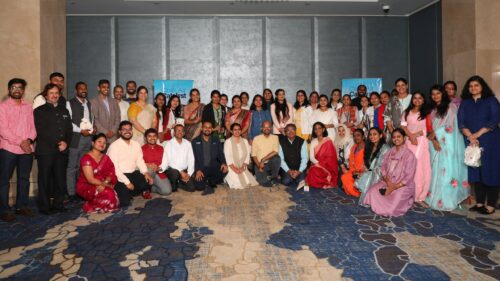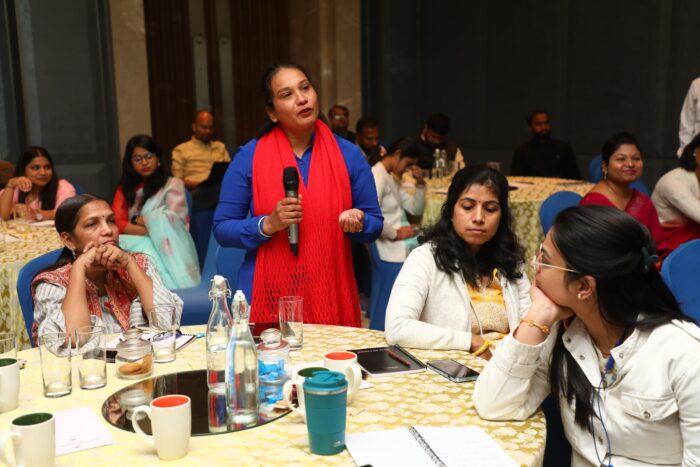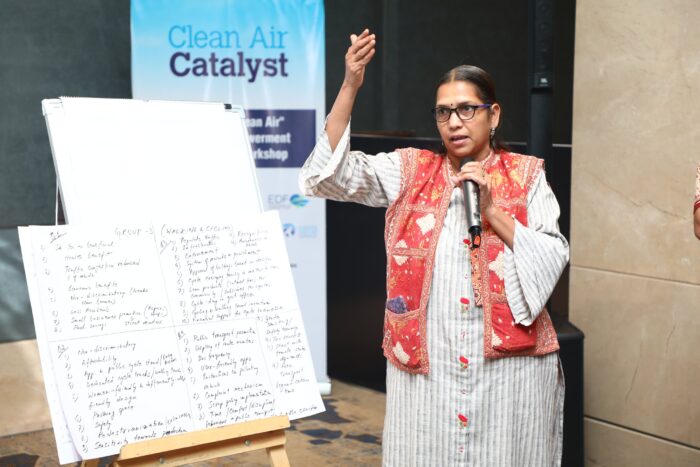Women are Taking on Indore’s Air Pollution Crisis by Transforming the Transport Sector

By Jessica Kempner, Azra Khan and Derek Schwabe, February 23, 2024
Indore—a city known across India for its commitment to cleanliness, having won the award for cleanest city of India for seven consecutive years — is now on a transformative journey to clean up its air. And just as in earlier efforts, women are at the forefront of this health and environmental transformation. In a workshop held on December 14, 2023, the Clean Air Catalyst team spotlighted the crucial role women are playing in cleaning up Indore’s air.
The workshop aimed to help the Catalyst develop a comprehensive understanding of the disproportionate impacts of air pollution on women and other marginalized communities and empower women as clean air champions. It also served as a platform for women from diverse backgrounds to help shape the growing city-wide initiative to cut air pollution by contributing insights from their own areas of expertise and lived experience; below are two of those stories.
Ritu Narwale: Paving the Way for Women Bus Drivers

Ritu Narwale is a trailblazer in a field predominantly occupied by men. Ritu’s journey into bus driving was not just about overcoming gender stereotypes but also about championing environmental sustainability. Ritu explained the barriers she faces and how the workshop encouraged her to own her role as a female bus driver.
“Initially, I faced skepticism and resistance. People questioned whether a woman could handle the complexities of driving a bus. However, the workshop shed light on the importance of women’s representation in the transport sector, encouraging me to continue to break barriers and become a role model for others,” Ritu commented.
She continued by sharing the concerns that women drivers and commuters have and how her presence helps. “Women passengers find solace in our presence, recognizing the importance of a female perspective. We consider diverse needs, such as those of pregnant women. However, the lack of infrastructure [at work], including restrooms, underscores the need for improved working conditions. Additionally, a stigma persists that suggests women aren’t capable drivers, hindering opportunities and perpetuating biases.”
Aishwarya Agarwal from OMI Foundation, a think tank focused on the intersection of mobility innovation, governance, and public good – agreed: “Women’s perspectives are often underrepresented in decisions related to urban planning, transport, and automobile sectors. Having more women involved in these discussions can lead to more inclusive and safer transport systems.”
Ritu’s experience shows the need for inclusivity in decision-making processes and its value. Her story echoed discussions held during the workshop on the importance of women in decision-making roles within the transport sector.
Anupa Gokhale: Including Women throughout the Transport Sector

Increasing women’s participation in all roles in the transport sector is transformative. It breaks entrenched gender barriers and creates pathways for women, especially those from low income and marginalized communities and women with disabilities, to shape the transportation landscape, which is why women need representation at every level, from drivers to policy-makers. This isn’t just a matter of equality; it’s about enriching the sector with diverse perspectives and experiences, making it more responsive to the needs of all commuters.
Anupa Gokhale, a representative from a local NGO working on gender and equity, underscored this point, alluding to the need for better information on women’s needs: “Firstly, a robust collection of data on women’s mobility patterns is crucial. Understanding how women navigate the urban landscape allows for tailored solutions that meet their specific needs.”
Anupa added: “This data-driven insight informs the second imperative: designing for universal access. Streets, public spaces, and transportation systems must be meticulously crafted to accommodate the diverse requirements of women, ensuring that they feel safe, comfortable, and welcomed. Additionally, the availability of supporting amenities is a linchpin in fostering gender-inclusive mobility.”
Women representatives from the health sector observed patterns of gender inequality when it comes to community inclusion in transport policies. “Women are rarely given the platform to share their views and suggestions and when they are, many are not confident that their opinions will be valued,” she said. “Clear information, encouragement, and action steps are key to enabling women from marginalized communities to meaningfully participate. Further, other family members—especially male members—should also be involved in gender empowerment dialogs and training.”
Paving the Way for Gender Inclusivity
The contributions of workshop participants like Ritu, Aishwarya, and Anupa fed into policy recommendations and government initiatives that could catalyze clean air action in the transport sector. Participants especially emphasized the following areas with the greatest potential:
- Targeted recruitment initiatives that encourage women to join the transport sector can be game-changers. Scholarships, training programs, and mentorship opportunities are some examples of initiatives that can make professions in the transport sector more accessible to women.
- Developing female-friendly infrastructure, including well-lit bus stops, dedicated restrooms, and secure parking spaces to encourage more female participation in the sector. They would not only meet some of the most commonly expressed needs of female drivers, but help create safer and more accessible transport systems for everyone.
- Government-led awareness campaigns can help challenge problematic stereotypes and gender norms by highlighting the successes and contributions of women in the transport sector, paving the way for a more inclusive industry.
- Comprehensive safety measures, including increased surveillance, emergency helplines, and community policing, can help address the safety concerns faced by women drivers and passengers, opening doors for more women to participate confidently in the sector.
Indore’s recent progress in improving the gender balance in traditionally male-dominated sectors such as waste management highlights the importance of fostering inclusive environments, and offers a blueprint for how policy can support women’s economic empowerment. Initiatives such as the Indore Municipal Corporation’s support of female waste pickers, who earn their livelihoods by collecting and segregating recyclable materials from waste, have positively impacted women’s livelihoods. Extending similar interventions to sectors like transportation, where women face barriers such as limited training opportunities, unequal pay, and safety concerns, is crucial. Implementing specialized training programs, ensuring equal pay and opportunities for advancement, and enhancing safety measures can replicate the success observed in other sectors, fostering gender equality across industries.
Clean Air Catalyst is a USAID-funded global partnership advancing a comprehensive, integrated, and locally-driven methodology for reducing air pollution and exposure to health-damaging pollutants in Indore, India and other cities. It is designed to provide extensive inter-related climate, health, gender, and equity benefits and to take into account complex social and political dynamics that often create barriers to change.

